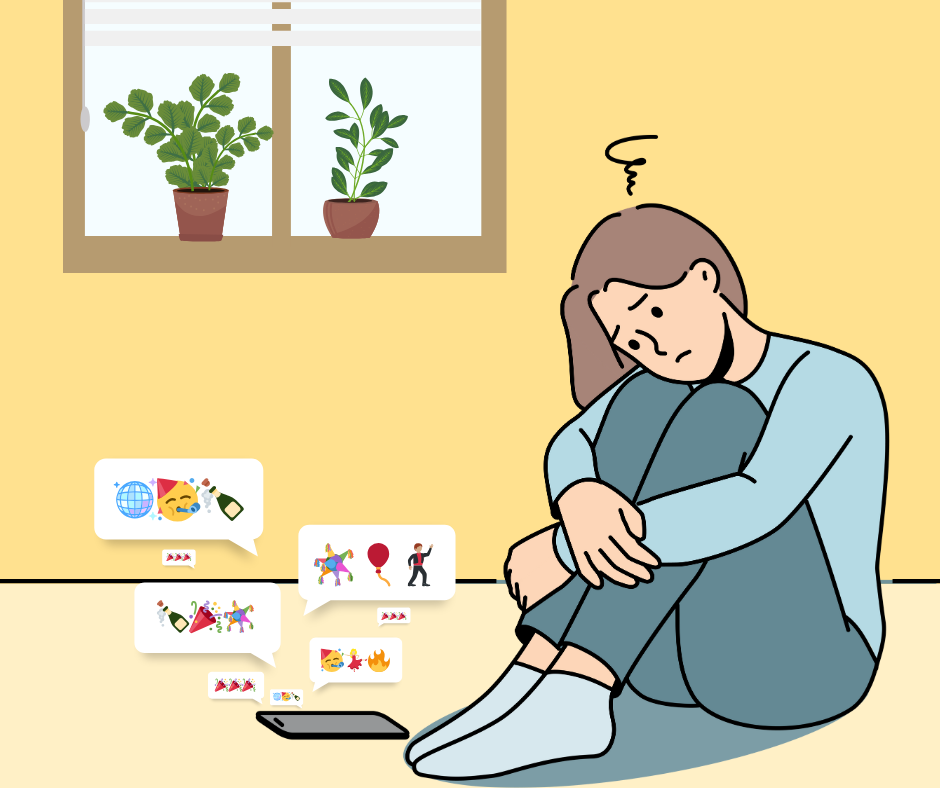This post is written by a member of the Debut Student Publisher Network. Read on for Christine’s thoughts on the millennial plague that affects us all:
FOMO, or the “fear of missing out,” is a nagging feeling that you’re missing out on fun, excitement, or opportunities that others are enjoying. It’s a common phenomenon, particularly in our hyper-connected world, where social media makes it seem like everyone else is living their best life while you’re stuck at home. But the truth is, FOMO isn’t a reflection of reality, and missing out isn’t necessarily a bad thing. In fact, there are plenty of reasons why staying in can be just as fulfilling as going out. Let’s dive deeper into why it’s okay to give yourself permission to sit this one out.
Peer Pressure Isn’t Worth It

One of the biggest culprits behind FOMO is peer pressure. Whether it’s subtle nudges from friends saying, “Oh, you have to come! Everyone’s going!” or more overt criticism like, “Don’t be such a buzzkill,” it can feel hard to say no. This kind of pressure often makes us feel like we’re letting others down or missing a vital social experience.
However, the reality is that peer pressure is more about other people’s expectations than your own happiness. It’s important to remind yourself that you’re the best judge of what feels right for you. If going to a loud party after a long week sounds like a nightmare, that’s valid! True friends will respect your boundaries and understand that saying no isn’t a rejection of them—it’s an act of self-care. By standing firm in your decisions, you build confidence in prioritizing what matters to you, rather than what others expect.
Social Media Creates Unrealistic Expectations

Social media platforms like Instagram and Snapchat are notorious for fueling FOMO. You scroll through photos of your friends laughing, dancing, and seemingly having the time of their lives, and suddenly you feel like you’re the only one missing out. But here’s the thing: social media isn’t reality—it’s a highlight reel.
People rarely post about the dull or unpleasant moments of their lives. You won’t see pictures of someone standing awkwardly at a party where they don’t know anyone or the discomfort of waiting 30 minutes for a drink at a crowded bar. Those posts are carefully curated to showcase the best moments, often exaggerated for likes and validation. Understanding this can help you detach from the illusion that others are living perfect, non-stop exciting lives.
Instead of comparing your day to someone else’s highlight reel, focus on what makes you happy in the moment. Whether it’s a quiet night in or a solo activity you enjoy, remember that your happiness doesn’t need to be broadcasted to be real.
Fun Is Different for Everyone

Fun is a deeply personal experience, and what’s enjoyable for one person might be exhausting or boring for another. For example, some people thrive in high-energy environments like nightclubs or concerts, while others find joy in quieter, more introspective activities like reading, crafting, or gardening.
If you’re not a “party person,” that doesn’t mean you’re missing out—it just means you have different preferences. Recognizing this can be incredibly freeing. Instead of forcing yourself into situations that don’t align with your personality, focus on activities that bring you genuine happiness. This might include binge-watching your favorite series, experimenting in the kitchen, or spending time with loved ones in a more relaxed setting.
The beauty of staying true to yourself is that it allows you to explore and embrace your unique interests. Over time, you may even inspire others to try out the things you love, creating deeper and more meaningful connections.
Everyone Experiences FOMO

It’s easy to feel like you’re the only one experiencing FOMO, but the truth is, it’s a universal emotion. Even the most outgoing and social people feel it from time to time. They might see a group of friends on vacation without them or hear about an event they couldn’t attend, and suddenly, they’re questioning their choices too.
Acknowledging that FOMO is a shared experience can be incredibly comforting. It reminds you that you’re not alone and that feeling left out doesn’t mean you’re any less valued or loved. In fact, discussing FOMO openly with friends can be a great way to bond and normalize these feelings. You might even find that the people you envied for their social lives sometimes wish they had the courage to take a break like you did.
Recharging Is Essential for Your Well-being

Socializing can be a lot of fun, but it can also be draining—especially for introverts or people who’ve had a long week. Taking time to recharge is not only okay, but it’s also necessary for your mental and physical health.
When you stay in, you give yourself the opportunity to relax and focus on self-care. This could mean catching up on sleep, indulging in a spa night, or simply enjoying some uninterrupted alone time. These moments of rest help you reset, making you more energized and present for future social interactions.
Think of it this way: skipping one night out doesn’t mean you’re missing out; it means you’re investing in your well-being. And when you see everyone else dealing with hangovers the next day while you feel refreshed and ready to take on the world, you’ll be glad you chose to recharge.
Opportunities Come Around Again

A common cause of FOMO is the belief that you’re missing out on a “once-in-a-lifetime” opportunity. Whether it’s a party, a concert, or a trip, the fear of never getting another chance can be overwhelming. But here’s the truth: life is full of opportunities, and most events aren’t as singular as they seem.
Another party will come around. Another concert will happen. Another chance to connect with people will present itself. Missing one event doesn’t mean you’ve missed your shot at fun or connection forever. In fact, taking time to reflect on why you feel FOMO can help you better prioritize the events and experiences that truly matter to you.
Your Time, Your Choice

Ultimately, your time is your own, and how you spend it is entirely up to you. Whether you choose to stay in or go out, the most important thing is that your decision aligns with your needs and values.
FOMO can make it tempting to follow the crowd, but remember that your happiness isn’t tied to what others are doing. By making intentional choices, you empower yourself to create a life that feels authentic and fulfilling. So, whether it’s a quiet night in or a spontaneous adventure, own your decision and embrace the moment.
Reflect on Why You Feel FOMO

When FOMO strikes, it’s an opportunity to dig deeper and understand what’s driving those feelings. Are you genuinely interested in the activity you’re missing, or are you worried about how others perceive you? Do you feel left out, or are you craving connection in general?
By identifying the root cause of your FOMO, you can take steps to address it in a meaningful way. For instance, if you’re craving social interaction, you might plan a more intimate get-together with close friends instead of attending a big event. If you’re worried about missing an opportunity, remind yourself of the other ways you can create similar experiences in the future.
Practice Gratitude for the Present
Instead of focusing on what you’re missing, take a moment to appreciate what you have. Gratitude can shift your perspective, helping you feel more content and less preoccupied with the “what ifs.”
Whether it’s the comfort of home, the freedom to relax, or the joy of engaging in your favorite activity, there’s always something to be thankful for. Practicing gratitude reminds you that life’s simple pleasures are just as valuable as its grand adventures.
Follow Christine on Twitter @slytherchris
Connect with Debut on Facebook and Twitter


